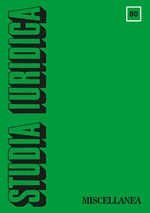The Transformation of Political Crimes and its Impact on the Hungarian Criminal Regulation with Special Regard to the Interwar Period
The Transformation of Political Crimes and its Impact on the Hungarian Criminal Regulation with Special Regard to the Interwar Period
Author(s): Izabella DrócsaSubject(s): Politics / Political Sciences, Politics, Law, Constitution, Jurisprudence, Political Sciences
Published by: Wydawnictwa Uniwersytetu Warszawskiego
Keywords: political crimes; Criminal Code; libel against the nation; przestępstwa polityczne; kodeks karny; zniesławienie narodu
Summary/Abstract: In the 20th century, the perception and quality of political crimes underwent significant changes, which led to the creation of constitutional law. Act III of 1921 was the first piece of legislation that substantially tightened the scope of crime against the state, but because of precisely defined offences and related judicial practice, it could be avoided that deeds, which essentially fall within the scope of the exercise of fundamental rights, could fall under the Act. The following significant criminal law, which strengthened existing provisions to an extent that provided a good basis for the establishment of a later Communist dictatorship, was brought about by the persistence of Soviet presence following the World War II.
Journal: Studia Iuridica
- Issue Year: 2019
- Issue No: 80
- Page Range: 71-87
- Page Count: 17
- Language: English

